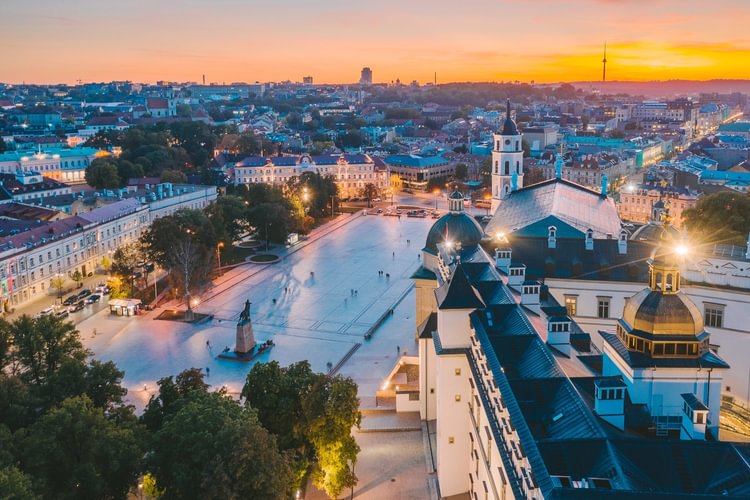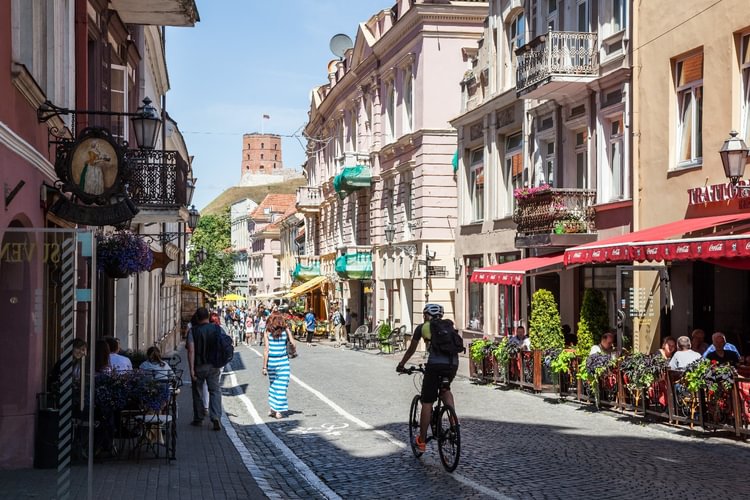Lithuania’s 18 years in the EU: co-creating a prosperous country
According to Eurobarometer, Lithuanians are among the staunchest EU backers, with 59% of the respondents claiming to be in favour of the EU (the EU average being 47%). The pro-European sentiment has been observed since the admission of the country to the Union on May 1, 2004. The celebration of the Europe Day provides us with a great opportunity to look back on our achievements over the last 18 years across the key areas of economy, culture, governance and science.
Diverse, growing, and competitive: the face of the Lithuanian economy
Today, Lithuania’s economy is as diverse as it has ever been, offering the right environment for both startups (of which there are more than 1000) as well as for established businesses operating in the fields of IT, high value-added manufacturing, Fintech, Cybersecurity, etc. The success of these sectors is attributed to a multitude of factors, including to the digital skills availability (Lithuania is 5th globally!).
The country’s talent pool has put Lithuania on the maps of foreign investors, making Lithuania 3rd in Europe for attracting Foreign Direct Investment (FDI) across all sectors. Major household names that have chosen Lithuania in the last decade include banks, automotive giants, and some Silicon Valley unicorns. Speaking of unicorns, Lithuania already has two of them: Vinted, an environmentally minded online marketplace, and Nord Security, a company behind world-leading VPN and other cybersecurity products.
Innovations for a connected Europe and a connected world
Despite its relatively small size, Lithuania has made its name in its fair share of science and innovation: from life sciences to blockchain technology. For instance, Lithuania is a hotbed for gene research, with Vilnius University professor Virginijus Šikšnys being one of the minds behind CRISPR “gene scissors”. In the field of Finance, the country’s Central Bank was the first to mint a digital collectors’ coin, paving the way for the adoption of the Central Bank Digital Currency (CBDC).
Photonics is another area where Lithuanian researchers thrive. The country’s laser industry currently occupies more than 50% of the world’s ultrashort scientific laser market, with Lithuanian lasers at CERN, NASA, and leading laboratories in the US. Besides, more than 95 of the world’s TOP 100 universities are using lasers made in Lithuania. By co-creating modern solutions to global challenges, Lithuanian scientists and entrepreneurs are working hard to make Europe and the entire world a better place.
A pioneer of energy independence
Long before the issue became a central talking point across all EU 27 member states, Lithuania had already staked its claim as a pioneer of energy independence from Russia. In this area, the country greatly benefitted from EU support: the EU has provided funding for important regional energy projects, including the NordBalt submarine electric power link between Lithuania and Sweden, and the GIPL gas interconnection between Poland and Lithuania. The GIPL gas pipeline, which connects the gas markets of Lithuania, the other Baltic countries and of Finland with the European Union via Poland, stretches 165 kilometres in Lithuania and 343 kilometres in Poland. ‘The 508-kilometre pipeline links the Lithuanian and Polish gas markets to the rest of the EU. This step strengthens the energy independence of the region and increases the possibilities of using the Klaipėda LNG terminal’, said Ingrida Šimonytė on 5th of May on the occasion of the launch of the GIPL.
Since the beginning of April 2022, the Lithuanian gas system has been operating free of Russian gas imports, becoming the first country in the EU to disconnect entirely from Russian gas supplies. The decision to reduce the country’s dependency on Russian energy was made back in 2014, when the Klaipėda LNG terminal, Independence, was inaugurated in a bid to end the monopoly of Russian gas supply.
A European standard of living
Since its accession to the EU, Lithuania has been working hard to become a country that means opportunities. With both international companies and local startups setting up offices in major cities, Lithuania offers every chance to accelerate your career and make a global impact. At the same time, affordable living and shorter commutes leave plenty of time for life away from work.
As an EU member, Lithuania also follows one of the founding principles of European integration: freedom of movement. According to surveys, Lithuanian people particularly value their right to travel, work, and study freely in all the EU member states, which allows them to gain valuable experience abroad. At the same time, freedom of movement has also brought challenges: many people have chosen EU countries for work. Though significant emigration has been a challenge for years, in 2019, a statistical reversal was captured: more people came to live in Lithuania than left the country, majority of the immigrants being repatriating Lithuanians.
Lithuanians are also among the most active participants in European student exchange programmes. More than 42,000 students and HE members from Lithuania have gone to study abroad through the Erasmus+programme and nearly 32,000 have come to study in Lithuania. With 1.4% of residents taking part in the Erasmus+ higher education exchange, Lithuania is first among Erasmus+ countries by percentage share of population participating in the programme.
Thriving culture and arts scene
Lithuanian artists have made their presence felt on both the European and global stage. In classical music, Lithuanian women are continually in the spotlight. In recent years, the world has gazed attentively on Asmik Grigorian (the world's best female opera soloist), Mirga Gražinytė-Tyla (the world’s best female conductor), and Žibuoklė Martinaitytė (female composer of the year and a Guggenheim Fellowship recipient). Meanwhile, Lithuanian artists Lina Lapelytė, Vaiva Grainytė, and Rugilė Barzdžiukaitė earned the world’s highest award in contemporary art, the Golden Lion, at the 2019 Venice Biennale for their opera-performance, Sun & Sea (Marina).
Lithuania has also twice hosted a European Capital of Culture – a European Commission’s initiative meant to promote cultural diversity and intercultural dialogue in Europe. The project was held in Vilnius in 2009. Kaunas, Lithuania’s second largest city, holds Europe’s most important cultural title this year. Positioning culture as a catalyst for creativity and a vital element in the EU’s international relations, Kaunas European Capital of Culture 2022 is hosting hundreds of festivals, exhibitions, stage events, and concerts, including shows by such well-known artists as Marina Abramović, Yoko Ono, and William Kentridge.
A trusted partner
Together with the entire democratic world, Lithuania firmly supports Ukraine’s fight for sovereignty and freedom. The country has already hosted nearly 52,000 war refugees from Ukraine. According to the European Union’s Blueprint research initiative, this represents 1.7% of the country’s population, which ranks Lithuania third in Europe after Poland and the Czech Republic.
In terms of contributing to the defence of Ukraine, Lithuania was among the first to provide financial, humanitarian and military aid. In March, the Lithuanian parliament, Seimas, adopted a resolution calling for EU candidate status for Ukraine. All 123 participating MPs supported the call.
On the occasion of the 18th anniversary of Lithuania’s EU membership, Prime Minister Ingrida Šimonytė has said that Lithuania has grown over these years and is now able to help those who still seek membership in the community of European nations.
‘Ukraine is forced to pay a huge and tragic price for its free choice today, and we wholeheartedly support its decision to join the EU, serving as its voice in the EU capitals’, said the Prime Minister.


